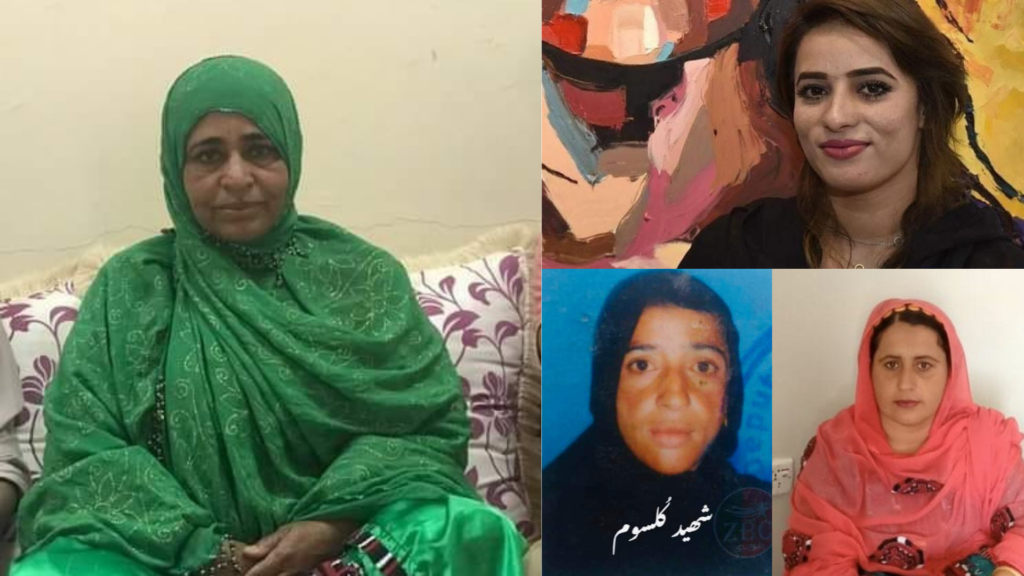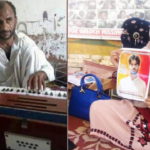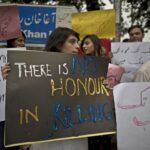A police constable shot and killed a woman in the Tump village of District Kech, Balochistan, on 18 October. The families of the constable, Aslam and Naim Hameed, had a dispute over a piece of land. The dispute turned violent and the elderly woman, Asia Bibi tried to interfere and he shot her dead. The policeman shot and killed Naim Hameed at the scene as well.
Since the beginning of this year, there have been cases of killing of women almost every month. The killers in most cases had ties either with the military or powerful families. One of the killers of Malik Naz, shot dead in May, had an ID card from the Military Intelligence when the deceased’s family members caught him. A young journalist, artist, poet and social activist, Shahina Shahin, was killed allegedly by her husband. The accused, Mehrab Gichki, belongs to a powerful family, once the royals family of Makkoran, and hence said to have been enjoying impunity and roaming free so far. Neither the government, nor the political parties put any pressure for justice for the young journalist.
Moreover, thirteen other people were killed in different areas of Balochistan during the month of October, 2020. Also, the FC has adopted a new policy of punishing family members of armed nationalists, locally called Sarmachaar, freedom fighters.
The army would bury the ones who were killed in encounters. In September 2020, military buried bodies of Irfan and Noor Khan, who were killed during a clash, near an army base, closed to a village. Family members complain that they could feel the smell of dead bodies, as they were just put under some mud and thrown away. The families tried their best to get permission and give their dead ones a proper burial but the forces did not allow it.
On October 25, Mubashir Hoth and Mukhtar were killed in a skirmish with security forces in the Kulbar area of District Kech. The forces handed over the bodies to the civil administration and ordered to bury them in the absence of their families. In a recent encounter, Ishaq was shot and killed and buried by forces on 30 October in the Buleda area of Kech. Ishaq was a member of Balochistan Liberation Front, one of many armed nationalist groups fighting for the independence of Balochistan.
The body of Manzoor Ahmed Kakar, a resident of Kili Gul Mohammad Quetta, was found dumped in a desolated area in Kuchlak, Balochistan. He had been slaughtered and the skin had been peeled off from his face.
Three bodies were found dumped in District Panjgur. One among them was identified as Abdul Rauf while the other two persons remained unidentified till the time of writing this report.
Two bodies were found in the Windar and Hub cities of Balochistan’s Lasbela district on 05 October. The bodies were decomposed and were sent to the hospital for identification but remained unidentified till the time of this report.
The body of an eight years old boy was recovered from Mezai Ada area of Qila Abdullah. According to the autopsy report, he was raped and then killed. Authorities have ignored the case and no action was taken on the case.
Six persons were killed in target killing during the month, including a singer, Hanif Chamrok, the father of a human rights activist. Hanif was shot dead by two persons near his house on 07 October in Turbat.
On 22 October, Naseebullah Mir Haji Samalani was shot and killed by unknown gunmen in Bolan, and Imdad Shah and Nora were shot dead in Mastung, 25 kilometers from Quetta, the capital town of Balochistan.
On 05 October, Abdul Shakoor was shot and killed in Noshki town.
The Balochistan Liberation Army, an armed nationalist group claimed responsibility for killing three persons in a bomb blast in a busy street of Quetta on 25 October, 2020. In a statement, the organization said it has successfully attacked and killed Azad Khan Marri, who the organization blamed for being a spy for the security forces in the region and been helping the army in disappearing and killing their members.
On October 14 a bomb blast in Quetta targeted the construction work of Samangali road under a bridge and claimed seven lives while injuring another five. According to the police, unidentified men on a motorcycle hurled with a grenade and fled. The injured were immediately taken to the hospital.
The policy of killings started after years of ‘successful’ policy of enforced disappearances in Balochistan, which started in the early 2000s and is still continuing. Tens of thousands of people have been victims of enforced disappearance. Thousands of them have been killed after being abducted.
Nine persons were forcibly disappeared during the month of October 2020, including former members of armed groups. Sodager, Habib Khan and Tariq of the Marri tribe had abandoned the arm struggle and surrendered to the security forces. The FC abducted them on 16 October when they were traveling from Kolpur to Quetta.
Their whereabouts remain unknown until now.
On 07 October, personnel of the FC and some gunmen in civilian dress abducted Dinar one Haider in Kech. He was abducted from the main bazar of a village in front of the public. His whereabouts remain unknown to the family.
On 13 October, the forces launched an operation in the Gichk area of Panjgur and disappeared two shepherds, Allah Dad and Shah Murad.
On 22 October, Tahir Bakhshi and Samir were forcibly disappeared from Pidrak, Kech, and Gwadar, the town of the deep sea port which is part of the China-Pakistan Economic Corridor (CPEC). Some men with guns in army vehicles broke into a house in TTC colony of Gwadar town and picked up Saveed and Saeed, two young brothers. The third brother, Samir resisted, and asked for the reason. He was taken too. Later, the other two brothers were released but Samir did not return and his whereabouts are still undisclosed. Tahir Bakhshi, abducted from Pidrak, is a laborer in UAE. He had recently come back to spend his vacations with his family.


